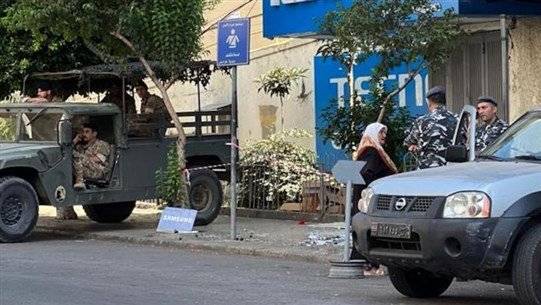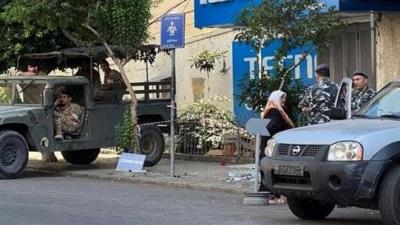The Lebanese Army and Internal Security Forces have established a tight security cordon in the city of Tripoli and at its entrances following a crime on Friday evening that resulted in the deaths of four individuals inside a mobile phone shop in the Al-Tal area. This incident marked a troubling return to scenes of chaos and violence, which had previously diminished in the city. Whether the crime was motivated by theft or terrorist reasons will be clarified through ongoing investigations, shedding light on the circumstances.
Tripoli, amidst this turmoil, is indeed the soft underbelly of any potential security perturbations that may be brewing. The incident has revived fears significantly, especially in light of the widespread presence of weapons, an increase in casualty rates from such lawlessness, and a daily rise in gangs, thefts, and crimes without any legal deterrent against perpetrators. Political analyst and writer Shadi Nashaba pointed out to "Voice of the Nation" that Tripoli is experiencing social chaos and security deterioration due to difficult living conditions, economic challenges, and political vacuum. Some groups exploit these circumstances for various reasons, including sending political messages and creating security chaos. Unfortunately, at various moments in Lebanon's political history, Tripoli has served as a mailbox for these exchanged messages.
Nashaba added: "It cannot be definitively stated that what occurred in Tripoli a few days ago was an act of terrorism or a solitary crime; however, if conditions continue as is, with unchecked chaos at all levels, Tripoli will be negatively impacted. Sadly, we will witness more security tensions and pay the costs resulting from this ongoing disorder."
The recent event in Tripoli is seen as part of the broader chaos that has been prevalent in the city for several months. Observers consider it a "normal state of social disintegration" due to the complete absence of the state and the security apparatus's failure to perform its duties. Analysts emphasize that the Prime Minister's retreat from addressing his city’s issues and the lack of a developmental plan to uplift struggling Tripoli—not to mention the decline in security control despite the Interior Minister being a native of Tripoli—are contributing factors to the city's current chaotic state.
The tragedy resulted in the deaths of four individuals, including shop owner Mahmoud Khader (48 years old) from Jabal Mohsen, young brothers Mohammed and Omar Al-Hosni from the town of Bbanein in Akkar who worked at his shop, and Khaled Abdul Majid, one of the assailants from the town of Kharba Dawood, known to have extremist ties.
Jabal Mohsen witnessed heavy gunfire on Friday evening during Khader's funeral, coinciding with intensified military and security patrols throughout the city to prevent any further reactions and escalations. Meanwhile, investigations regarding the incident are ongoing, with the Lebanese Army carrying out continuous raids in Tripoli's old markets and other locations, arresting those involved. The Army’s Directorate of Guidance reported: "On 9/10/2022, a force from the army, supported by an Intelligence Directorate patrol, conducted raids in the old market area of Tripoli in pursuit of those involved in the gunfire incident that occurred on 9/9/2022 in the Al-Tal region."
The report further stated: "During the raids, a citizen (B.H.) was arrested on suspicion of involvement in the gunfire, and two Kalashnikov rifles, three hand grenades, and a quantity of ammunition were seized. The arrested individual and the seized items were handed over to the relevant authorities, and an investigation was initiated under the supervision of the competent judiciary."
A broad segment of Tripoli residents agree that the performance of new deputies has not differed from their predecessors, as their activities mainly consist of meetings and gatherings that solve none of the city's pressing problems, from issues with generator owners to detained Islamists and various critical matters plaguing the city and its residents without any avenue for resolution. This occurs amid a complete absence of the municipal council, which is mired in disputes and unable to address the needs of the city, compounded by the governor’s indifference to the ongoing situation, content with issuing some circulars on paper while leaving their implementation to chance and fate.
Demands for a security plan to restore stability to Tripoli are emerging, similar to the plan enacted in 2014 that ended cycles of violence between Jabal Mohsen and Bab al-Tabbaneh.




